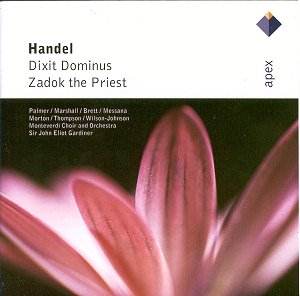Handel composed Dixit Dominus during the early stages
of his stay in Rome, in 1707. It is the most brilliant and famous of
the three Vesper psalms (the others being Laudate pueri Dominum
and Nisi Dominus), and in many ways echoes the style of harmonic
interplay favoured by Vivaldi and Corelli. The performance is a triumph
and the recording quality outstanding, given that it is now a quarter
of a century old.
Dixit Dominus is a large scale work, consisting
of eight movements arranged for five solo voices, five part chorus and
orchestra. It opens wonderfully with an incisive introduction played
by strings before solo voices and choir call and answer. One is immediately
struck by the clarity of the vocal parts and the exhilarating instrumental
harmonies. The second movement, Virgam virtuitis tuae is an aria
arranged for counter-tenor and cello continuo. Here I found Charles
Brett a little forced and uncomfortable in the upper registries. Following
this is an absolute jewel of a section, Tecum principium in die virtutis,
where dramatic violin flourishes and serene singing from Felicity Palmer
make a tremendous impression. Gardiner is renowned as a choir master,
and the vocal forces do not disappoint in the central choral sections,
Juravit Dominus and Tu es sacerdos in aeternam . However,
although enjoyable, I found the tempo rather rushed.
The two sopranos are tremendous in the highly demanding
Dominus a dextris tuis, and the impact of these voices interacting
with the tenors, bass and choir is almost terrifying in its intensity,
perfectly suiting the words ("he shall fill the places with dead
bodies and smite in sunder the heads over diverse countries").
The following duet (with chorus) is perhaps the most beautiful of all
(Da torrente in via bibet) and this particular performance justifiably
renowned, Palmer and Marshall serene and expressive throughout. The
final chorus, Gloria Patri et Filio, is tightly controlled but
still very convincing. Overall, this performance of the Dixit Dominus
easily maintains its status as one of the very best recordings.
Handel composed Zadok the Priest precisely twenty
years after Dixit Dominus for the coronation of George II in
Westminster Abbey, London. In fact Zadok was just one of four
anthems written in 1727, but, although the shortest, it is the most
majestic (and has since been played at every coronation since). The
tension of the famous opening crescendo is superbly maintained and the
explosive choral entry highly dramatic, and while the words may seem
rather absurd today ("May the King live forever! Amen, Amen, Allelujah,
Allelujah, Amen!), the message is driven home ecstatically.
These brilliant pieces are perfectly suited to John
Eliot Gardiner’s incisive style of conducting, and they are a very
welcome addition to the Apex super budget label. Gardiner and the Monteverdi
Choir and Orchestra were at an absolute peak during these formative
years and this recording remains one of the great early music releases.
Peter Bright
